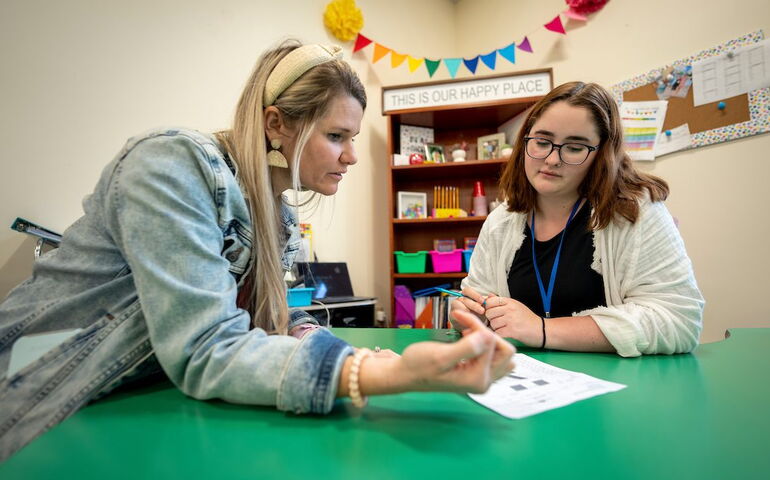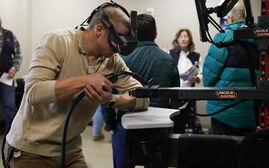Processing Your Payment
Please do not leave this page until complete. This can take a few moments.
- News
-
Editions
View Digital Editions
Biweekly Issues
- December 1, 2025
- Nov. 17, 2025
- November 03, 2025
- October 20, 2025
- October 6, 2025
- September 22, 2025
- + More
Special Editions
- Lists
- Viewpoints
-
Our Events
Event Info
Award Honorees
- Calendar
- Biz Marketplace
UMaine program aims to train rural educators
 Photo / Courtesy University of Maine
Patricia A. Duran Elementary schoolteacher Julie Zucchi, left, mentors UMaine education student Avery Morrell.
Photo / Courtesy University of Maine
Patricia A. Duran Elementary schoolteacher Julie Zucchi, left, mentors UMaine education student Avery Morrell.
In Maine, where more than two-thirds of the population is rural, numerous programs aim to build Maine’s lagging rural workforce, including expanded training and career advancement opportunities in the health care, dairy and forest industries.
Aiming to do its part, the University of Maine has launched a program to provide providing mentoring and a support network to build the rural education workforce.
Rural Thrive, a rural education resilience program, launched this school year with a $3.3 million in federal funding secured by Maine's two senators.
“Rural schools and communities have unique workforce issues,” said Catharine Biddle, associate professor of educational leadership at UMaine and the program’s lead.
"Rather than take a deficit-minded approach that asks, What’s wrong with rural schools?, we wanted to look at the many benefits to teaching in rural environments, such as access to nature and smaller class sizes," she noted.
The program is led by UMaine’s College of Education and Human Development and includes educator preparation programs at other public universities across the state, as well Thomas and Colby colleges in Waterville.
Teacher shortages and other workforce issues are magnified in rural areas, where the pool of potential teachers is smaller, and especially in places where the economy and pay for public school educators have lagged behind other parts of the country, according to a news release.
The Rural Thrive project aims to facilitate mentorship and support at three points in educators’ careers: early-career (years one to three), mid-career teacher-leaders and those in building or district leadership positions.
The program includes regular virtual and in-person teacher gatherings, mentoring and one-on-one guidance between early-career and mid-career rural teachers.
An educator preparation component, called the Rural Substitute Teaching and Innovation Corps, connects education majors to hands-on experience as substitute teachers in rural schools.
Mainebiz web partners
Related Content

The Giving Guide
The Giving Guide helps nonprofits have the opportunity to showcase and differentiate their organizations so that businesses better understand how they can contribute to a nonprofit’s mission and work.
Learn More
Work for ME
Work for ME is a workforce development tool to help Maine’s employers target Maine’s emerging workforce. Work for ME highlights each industry, its impact on Maine’s economy, the jobs available to entry-level workers, the training and education needed to get a career started.
Learn More
Groundbreaking Maine
Whether you’re a developer, financer, architect, or industry enthusiast, Groundbreaking Maine is crafted to be your go-to source for valuable insights in Maine’s real estate and construction community.
Learn more-
The Giving Guide
The Giving Guide helps nonprofits have the opportunity to showcase and differentiate their organizations so that businesses better understand how they can contribute to a nonprofit’s mission and work.
-
Work for ME
Work for ME is a workforce development tool to help Maine’s employers target Maine’s emerging workforce. Work for ME highlights each industry, its impact on Maine’s economy, the jobs available to entry-level workers, the training and education needed to get a career started.
-
Groundbreaking Maine
Whether you’re a developer, financer, architect, or industry enthusiast, Groundbreaking Maine is crafted to be your go-to source for valuable insights in Maine’s real estate and construction community.
ABOUT
NEW ENGLAND BUSINESS MEDIA SITES
No articles left
Get access now
In order to use this feature, we need some information from you. You can also login or register for a free account.
By clicking submit you are agreeing to our cookie usage and Privacy Policy
Already have an account? Login
Already have an account? Login
Want to create an account? Register
Get access now
In order to use this feature, we need some information from you. You can also login or register for a free account.
By clicking submit you are agreeing to our cookie usage and Privacy Policy
Already have an account? Login
Already have an account? Login
Want to create an account? Register










0 Comments